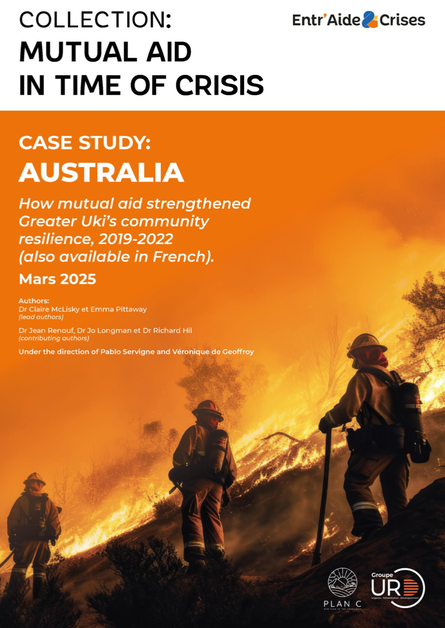Collection "Mutual aid in times of crisis" - case study: Australia

This report considers the forms, characteristics and dynamics of mutual aid, and the relationship between mutual aid and official responses, in Greater Uki, located in the Northern Rivers region of New South Wales, Australia.
Over the past five years, Greater Uki has experienced a series of compounding climate-related crises, including two unprecedented events: large bushfires in 2019-20, and a major flood in 2022, in addition to the COVID-19 pandemic. These crises have had an enormous effect on the area, with the loss of life, houses, possessions and ongoing mental health impacts, and have given rise to various forms of mutual aid, both spontaneous and organised.
About the 'Mutual aid in times of crises’ Project
People who suffer disasters while unprepared and untrained to deal with them tend to cope by means of mutual aid and spontaneous, informal self-organisation. Aid and relief actors only rarely, however, avail themselves of this potential for working together. This contradiction underlies the project ‘Mutual aid in times of crisis’.
This operational research project is based on a series of case studies, enabling better understanding of the mutual aid processes that spontaneously emerge in times of crisis, and how these intersect with official aid.
The case studies were selected to illustrate different types of crisis (natural disaster, major inflow of migrants, conflict), analysing mutual aid strategies according to the type of crisis and the socio- political context.
Three case studies consider sites in France: the Roya Valley, which was struck by Storm Alex in 2020; the Briançon region where a crisis caused by migrants arriving over the border has intensified over the past several years; and the island of Réunion, which is regularly struck by cyclones. A further three case studies consider N’Djamena in Chad where there was severe flooding in 2022; the Greater Uki area in Australia which suffered from catastrophic fires in 2019 followed by floods in 2020; and finally, Kharkiv in Ukraine where people have been surviving and mobilising to help each other since war began in 2022.
The case studies contribute to the development of a knowledge base and operational recommendations for people and individuals involved in mutual aid as well as organisations working in the sector of emergency aid and relief.